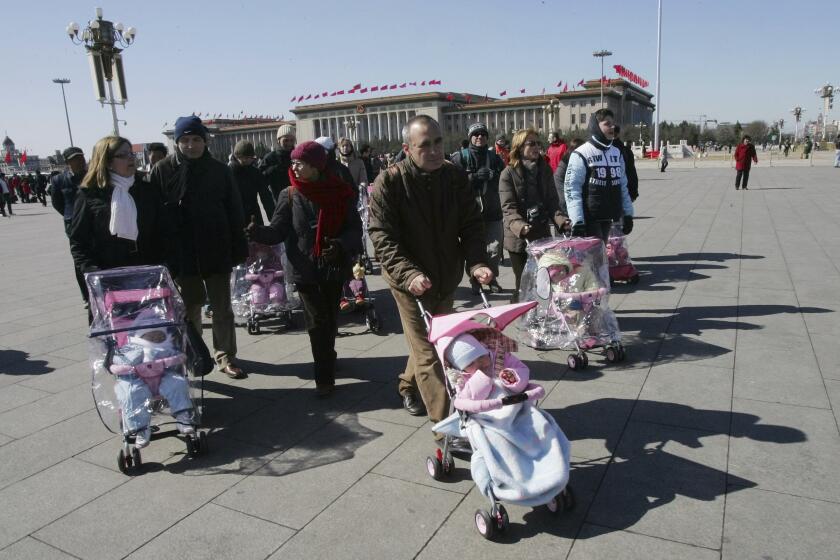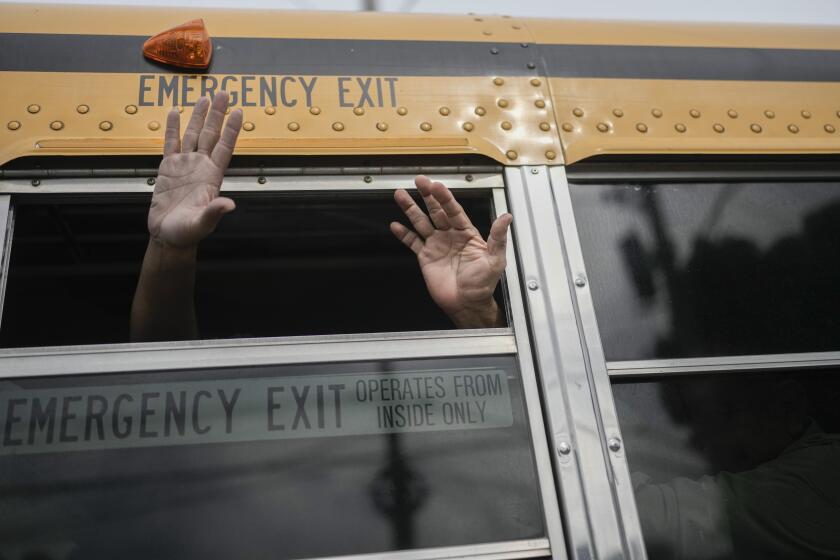3 Americans imprisoned for years in China arrive in U.S., as U.S. returns 4 people to China

WASHINGTON — Three American citizens imprisoned for years by China arrived back in the United States late Wednesday. Their release, announced earlier by the White House, was the result of a rare diplomatic agreement with Beijing in the final months of the Biden administration.
The Chinese government also announced Thursday that the U.S. had returned four people to China, including at least three Chinese citizens who it said had been held for “political purposes,” and a person who had been sought by Beijing for crimes and had been living in the United States. It did not identify the four.
The three Americans released by Beijing are Mark Swidan, Kai Li and John Leung, all of whom had been designated by the U.S. government as wrongfully detained by China. Swidan had been facing a death sentence on drug charges while Li and Leung were imprisoned on espionage charges.
A plane carrying the three men landed late Wednesday night at a military base in San Antonio.
Biden told reporters on Thursday morning that he has spoken to all of them and “I’m really happy they are home.”
The release comes just two months after China freed David Lin, a Christian pastor from California who had spent nearly 20 years behind bars after being convicted of contract fraud.
The three are Mark Swidan, Kai Li and John Leung, all of whom had been designated by the U.S. government as wrongfully detained.
U.S.-China relations have been roiled for years over major disagreements between the world’s two largest economies on trade, human rights, the production of fentanyl precursors, security issues that include espionage and hacking, China’s aggressiveness toward Taiwan and its smaller neighbors in the South China Sea, and Beijing’s support for Russia’s military-industrial sector.
The release of Americans deemed wrongfully detained in China has been a top agenda item in each conversation between the U.S. and China, and Wednesday’s development suggests a willingness by Beijing to engage with the outgoing Democratic administration before Republican President-elect Donald Trump’s return to the White House in January.
Trump took significant actions against China on trade and diplomacy during his first term. He has pledged to continue those policies in his second term, leading to unease among many who fear that an all-out trade war will greatly affect the international economy and could spur potential Chinese military action against Taiwan.
Still, the two countries have maintained a dialogue that has included a partial restoration of military-to-military contacts. President Biden and Chinese leader Xi Jinping met this month to discuss potential improvements.
David Lin, 68, had received a life sentence for contract fraud related to his fundraising to build a church in China. His family and the State Department denied the charge.
In a separate but related move, the State Department on Wednesday lowered its travel warning to China to “level two,” advising U.S. citizens to “exercise increased caution” from the norm when traveling to the mainland. The alert had previously been at level three, telling Americans they should “reconsider travel” to China in part because of the “risk of wrongful detention” of Americans.
The new alert removes that wording but retains a warning that the Chinese government “arbitrarily enforces local laws, including exit bans on U.S. citizens and citizens of other countries, without fair and transparent process under the law.”
The Biden administration had raised the cases of the detained Americans with China in multiple meetings over the past several years, including this month when Biden spoke to Xi on during the Asia-Pacific Economic Cooperation summit in Peru.
Politico was first to report the men’s release, which it said was part of a prisoner swap with the U.S. The White House did not immediately confirm that any Chinese citizens in American custody had been returned home.
However, Chinese Foreign Ministry spokesperson Mao Ning announced in Beijing on Thursday that “three Chinese citizens have returned to the motherland safe and sound.”
China will no longer allow international adoptions of its children. The only exception will be for relatives adopting a child or stepchild, a spokesperson said.
“China always firmly opposes U.S. suppression and persecution of Chinese nationals out of political purposes, and we will continue taking necessary measures to defend the legitimate rights and interests of Chinese nationals,” she said.
She added that a fourth person, “a fugitive who escaped to the U.S. many years ago, has also been repatriated to China.”
The fourth person’s nationality was not identified. Mao said “this shows that there will be no safe haven forever for criminals. The Chinese government will continue our efforts to repatriate the fugitives and recover criminals and illegal possessions until every fugitive is held accountable.”
Senators from both U.S. political parties praised the release of the Americans. Republican Sen. Ted Cruz of Texas said he was “overjoyed” — Swidan’s mother lives in Texas — and credited senior Biden administration officials with having “worked tirelessly to secure this achievement.”
Li, a Chinese immigrant who started an export business in the U.S. and lived in New York, was detained in September 2016 after flying into Shanghai. He was placed under surveillance, interrogated without a lawyer and accused of providing state secrets to the FBI. A U.N. working group called his 10-year prison sentence arbitrary, and his family has said the charges were politically motivated.
Guatemala President Bernardo Arévalo agreed to host the Nicaraguans while they apply for entry to the United States.
Democratic Senate Majority Leader Charles E. Schumer, who said he had worked for years to try to secure Li’s release, welcomed the news.
“Even when it felt like there was no hope, we never stopped believing that one day Mr. Li would return home,” Schumer said in a statement.
Leung was sentenced last year to life in prison on spying charges. He was detained in 2021 by the local bureau of China’s counterintelligence agency in the southeastern city of Suzhou, after China had closed its borders and imposed tight domestic travel restrictions and social controls to fight the spread of COVID-19.
After Leung’s sentencing, the U.S. recommended — without citing specific cases — that Americans reconsider traveling to China because of arbitrary law enforcement and exit bans and the risk of wrongful detentions.
Swidan had been jailed for 12 years on a drug charge and, along with Li and Leung, was considered by the State Department to be wrongfully detained.
Tucker, Madhani and Lee write for the Associated Press.
More to Read
Sign up for Essential California
The most important California stories and recommendations in your inbox every morning.
You may occasionally receive promotional content from the Los Angeles Times.














